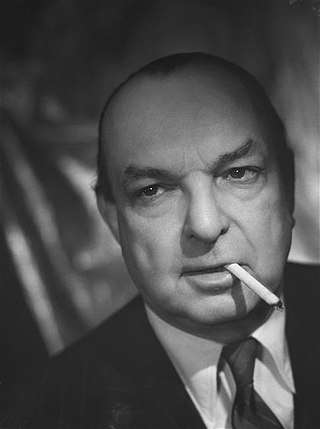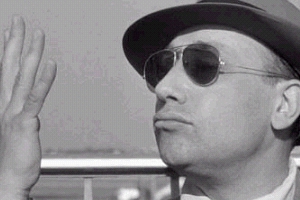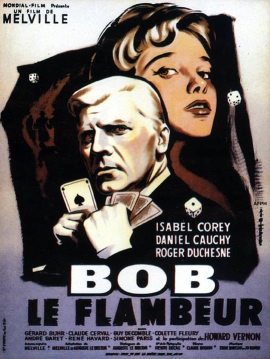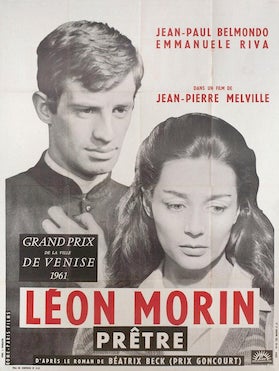Les Éditions de Minuit is a French publishing house. It was founded in 1941, during the French Resistance of World War II, and is still publishing books today.

Pierre Renoir was a French stage and film actor. He was the son of the impressionist painter Pierre-Auguste Renoir and elder brother of the film director Jean Renoir. He is also noted for being the first actor to play Georges Simenon's character Inspector Jules Maigret in Night at the Crossroads, directed by his brother.

Jean-Pierre Grumbach, known professionally as Jean-Pierre Melville, was a French filmmaker. Considered a spiritual father of the French New Wave, he was one of the first fully-independent French filmmakers to achieve commercial and critical success. His works include the crime dramas Bob le flambeur (1956), Le Doulos (1962), Le Samouraï (1967), and Le Cercle Rouge (1970), and the war films Le Silence de la mer (1949) and Army of Shadows (1969).

Le Silence de la mer (French:[ləsilɑ̃sdəlamɛʁ], English titles Silence of the Sea and Put Out the Light, is a French novella written in 1941 by Jean Bruller under the pseudonym "Vercors". Published secretly in German-occupied Paris in 1942, the book quickly became a symbol of mental resistance against German occupiers.

Bob le flambeur is a 1956 French heist gangster film directed by Jean-Pierre Melville and starring Roger Duchesne as Bob. It is often considered both a film noir and a precursor to the French New Wave, the latter because of its use of handheld camera and a single jump cut.

Howard Vernon, born Mario Walter Lippert, was a Swiss stage and film actor who appeared in films by Jean-Pierre Melville, Sacha Guitry, Fritz Lang, Roger Vadim, Jean-Luc Godard and Jesús Franco.
Henri Decaë gained fame as a cinematographer entering the film industry as a sound engineer and sound editor. He was a photojournalist in the French army during World War II. After the war he began making documentary shorts, directing and photographing industrial and commercial films. In 1947 he made his first feature film.

Le Doulos is a 1962 French crime film written and directed by Jean-Pierre Melville, adapted from the novel of the same name by Pierre Lesou. It was released theatrically as The Finger Man in the English-speaking world, but all video and DVD releases have used the French title. Intertitles at the beginning of the film explain that the French title refers both to a kind of hat and to the slang term for a police informant.

Is Paris Burning? is a 1966 epic black-and-white war film about the liberation of Paris in August 1944 by the French Resistance and the Free French Forces during World War II. A French-American co-production, it was directed by French filmmaker René Clément, with a screenplay by Gore Vidal, Francis Ford Coppola, Jean Aurenche, Pierre Bost and Claude Brulé, adapted from the 1965 book of the same title by Larry Collins and Dominique Lapierre. The film stars an international ensemble cast that includes French, American and German stars.
Nicole Stéphane was a French actress, producer and director.

Les Enfants terribles is a 1950 French film directed by Jean-Pierre Melville, with a screenplay adapted by Jean Cocteau from his 1929 novel of the same name about the tangled relationship of a close brother and sister.

François de Roubaix was a French film score composer. In a decade, he created a musical style with new sounds, until his death in 1975.
The French Syndicate of Cinema Critics has, each year since 1946, awarded a prize, the Prix Méliès, to the best French film of the preceding year. More awards have been added over time: the Prix Léon Moussinac for the best foreign film, added in 1967; the Prix Novaïs-Texeira for the best short film, added in 1999; prizes for the best first French and best first foreign films, added in 2001 and 2014, respectively; etc.

Le deuxième souffle is a 1966 French crime-thriller film directed by Jean-Pierre Melville and starring Lino Ventura, Paul Meurisse, Raymond Pellegrin, and Christine Fabréga.

Two Men in Manhattan is a 1959 French film noir written and directed by Jean-Pierre Melville. It stars Melville and Pierre Grasset as two French journalists in New York City who are searching for a missing United Nations diplomat. Although Melville occasionally played bit parts in the films of other directors, Two Men in Manhattan was his only starring role, and the only time he acted in one of his own films, other than providing the off-screen narration for Bob le flambeur (1956).

Léon Morin, Priest is a 1961 French drama film directed by Jean-Pierre Melville. It was adapted by Melville from Béatrix Beck's novel The Passionate Heart, which won the Prix Goncourt in 1952. Set during WWII in Occupied France, the film stars Emmanuelle Riva as a jaded, lapsed Catholic mother and widow of a Jewish husband, who finds herself falling in love with a young, altruistic priest, played by Jean-Paul Belmondo.
Sophie Renoir is a French actress. She is the great-granddaughter of the French Impressionist painter Pierre-Auguste Renoir (1841–1919), and daughter of the cinematographer Claude Renoir (1913–1993), granddaughter of actors Pierre Renoir and Véra Sergine, and grand-niece of film director Jean Renoir.
Ginette Vincendeau is a French-born British-based academic who is a professor of film studies at King's College London.
Christian Barbier was a French film and television actor.
Le Silence de la mer is a 2004 French-Belgian TV drama film directed by Pierre Boutron, based on the 1942 book of the same name by Jean Bruller, and starring Thomas Jouannet, Julie Delarme and Michel Galabru. The story takes place in 1941 during World War II, and concerns the relationship of a Frenchman and his granddaughter with a German captain, who occupies their house during the German occupation of France.












